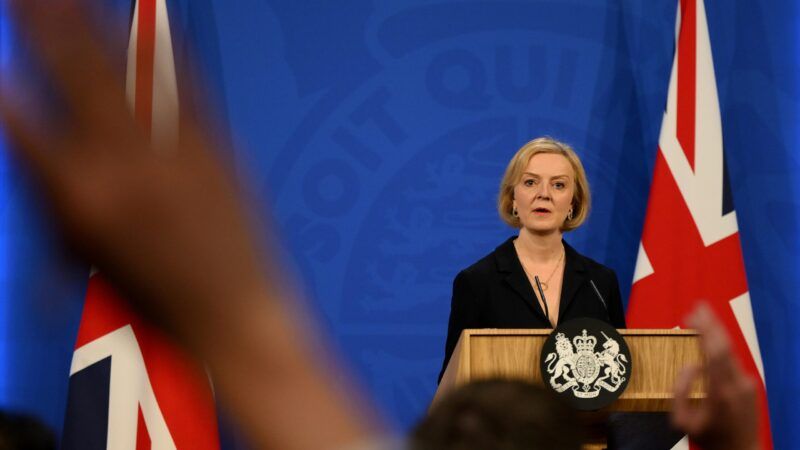Liz Truss Is Flailing, Politically and Economically
The British Conservative Party can’t figure out what it wants.

Has Liz Truss blown it already? After just over a month in the job, Great Britain's new prime minister finds herself in crisis—with worse approval ratings than her predecessor. Friday brought another twist, when Truss made the dramatic decision to fire her most senior cabinet minister, Chancellor of the Exchequer Kwasi Kwarteng, as part of an attempt to reset her premiership. But it may all be too late.
Where did it all go wrong for Truss? In Britain, it's conventional wisdom to point to the infamous "mini budget" of September 23, in which Truss marked her arrival with a sudden package of unfunded tax cuts. The mini budget may have spooked the markets—but does it tell the whole story?
Both the Truss tax cuts and their economic fallout have their roots in this summer's Tory leadership battle. Truss and her rival Rishi Sunak entered the contest agreeing that Britain's tax burden had become too high (35.5 percent of GDP, a peacetime record). They disagreed, though, on how to go about dealing with that situation.
Sunak's position was that tax cuts could only come after Britain had dealt with its other economic headaches: reducing the fiscal deficit and bringing down inflation. For Truss, this was the wrong way around. Britain's deficit, she argued, was the result of the country's anemic economic performance, partially caused by the cumbersome tax burden. She thought it better to cut taxes now and let the market work its magic.
After beating Sunak in the membership vote, Truss quickly put her hypothesis into action. But while most forecasters agree that her package of tax cuts and energy handouts (the latter set to cost £150 billion, or almost $168 billion, over two years) will help mitigate the immediate downturn, they balked at what it meant for our fiscal stability. Most see "Trussonomics" as a recipe for more borrowing and a greater risk of eventual default.
In Truss' defense, Britain isn't the only country dealing with this conundrum. Across Western Europe, major economies face the problem of aging populations, rising interest rates, and an addiction to printing money. While much of the continent remains impressively complacent in the face of this ticking time bomb, Truss' government has been the first of its peers to choose its particular lever—the old Reaganite fix of supply-side economic reforms.
Right now, the markets are nervous as yields on U.K. bonds accelerate much faster than France, Germany, or Japan, adding billions to the nation's already painful borrowing costs. But the picture is exaggerated by nervousness among flighty investors, few of whom would claim to know how this will play out in the long term.
But Truss' bigger problems are political, with a flurry of high-profile blunders raising questions about her judgment. Just 10 days after announcing she would scrap the higher tax rate levied on anyone earning more than £150,000 a year, Truss performed a screeching U-turn, conceding that the tax would stay after all.
Friday's sacking of Kwarteng was the most dramatic development yet: He was a close ideological ally who now has the honor of being the second-shortest-serving chancellor. In a calamitous press conference from Downing Street (never a good sign in British politics), Truss insisted her economic mission had not changed—even if some of her colleagues are speculating she will be gone within weeks.
Truss was meant to be a conviction politician. Yet for its short time in office her administration has been unable to balance its ideological instincts against the more humdrum political realities—hence the current paralysis over whether to increase state benefits in line with inflation or not, or whether to loosen immigration rules to boost growth. By scrapping her flagship tax cuts, she has telegraphed extreme weakness to her opponents within the Conservative Party.
The political realities aren't easy. As I've argued before, the British Conservative Party is increasingly wedded to big spending, at least for certain groups. In such circumstances, governing as a low-tax Tory is as difficult as navigating the laser beams you see in action movies.
Even before Friday, Truss was in an unenviable position: 30 points behind the Labour Party ahead of a (likely) 2024 election. In other words, she and her party are on the verge of an electoral wipeout. The big question, though, is whether she even makes it that far.
Having removed three sitting prime ministers in six years, the Conservative Party has gotten strangely used to deposing its leaders, all while retaining its power. The problem is that it's proving impossible to work out what party members actually want. As we enter winter, Truss may well prove to be the latest casualty of that conundrum.


Show Comments (57)